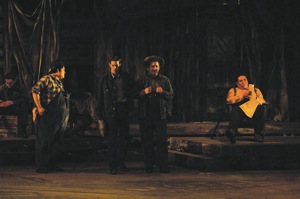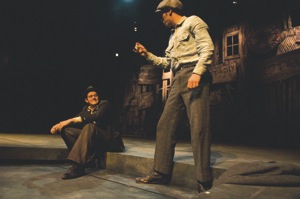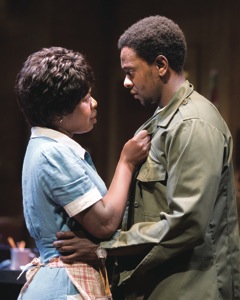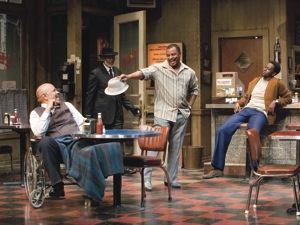-
- Dixon Osburn reflects on SLDN
- ‘Los Angeles Times’ sports columnist: ‘I’m a transsexual’
- Legislature sends gay rights bill to Iowa Governor
- AIDS rampant among American Indian population
- New Hampshire lawmakers approve civil unions for same-sex couples
- Federal measure would protect against GLBT workplace discrim-ination
- National News Briefs
- World News Briefs
Arts & Entertainment
Stories from the underclass
'The Grapes of Wrath' and 'Two Trains Running' reviewed
Published Thursday, 03-May-2007 in issue 1010
The Grapes of Wrath
The plight of migrant farm workers has not always been a border issue. In the 1920s, many poor white tenant farmers in Oklahoma were pushed off “their” land by poor agricultural practices and the sustained drought that caused the Dust Bowl. Many of them went West.
In 1940, novelist John Steinbeck won a Pulitzer Prize for his classic novel The Grapes of Wrath, which depicts the lives of Oklahoma farm workers on their journey to California in search of work, and the problems they encounter in that state.
Frank Galati’s Tony-winning adaptation of the novel plays through May 6 at San Diego State University’s Don Powell Theatre, directed by retiring theater professor Nick Reid.
Young hothead Tom Joad (Nick McElroy) returns home on parole and on foot after a prison stretch for murder. On the way, he meets old friend and former preacher Jim Casy (Brandon Joel Maier), who years ago had baptized Tom in the river but who now “ain’t so sure of a lot of things.” Casy asks the question that becomes a running joke: “Did you bust out?”
Tom and Casy team up for the rest of the trip. They arrive to find the Joad place abandoned and the family at Uncle John’s house. Times are rough, crops are failing from drought and the Joads have been pushed off “their” land. In response to locally circulated flyers touting jobs for 800 pickers, the family is about to embark on the long journey to California.
They load up their rickety old truck and become part of society’s dispossessed – the thousands hoping for a decent life in the orchards of California. What they find is hostility, harassment, unpleasant living conditions and starvation wages – and the understanding that they must either put up with the humiliation or risk loss of job (or worse) if they dare to speak up. Those with families generally did not dare.
But Tom and Casy see the evils being done to the workers and find themselves drawn to the organizing movement (and branded “Reds” for it). This was the genesis of what would later become the César Chavez campaign to unionize farm workers – different time, different workers, same problems.
The Grapes of Wrath is a complicated show to stage, requiring 23 actors (some of whom play multiple roles), musicians and a ramshackle Okiemobile that moves. This vehicle is an amazing piece of theater wizardry with an authentic-looking grill, clapboard siding and an overall look that says, “I’m not sure I can make it.”
My favorite among Reid’s large and talented cast is Kymm Hansen as Ma. Ma is really the heart of the show; it is her resourcefulness and determination that keep the family going. Hansen successfully portrays that. She is also the only cast member to consistently project her lines.
McElroy’s Tom, Maier’s Casy and Phil Kruse as Tom’s brother Al are also excellent and can be understood most of the time. In general, though, this show would benefit from stage or personal mikes. Some of the background sound levels also could use adjustment; occasionally music drowns out dialogue.
Kudos to musicians (Shawn Rohlf, Dan Broder and Beth Mosko), whose virtuosity on a total of seven instruments and interpretations of appropriate music add texture to the show. Thanks also to choreographer Margaret Larham, whose square dance scene is nicely put together.
Though The Grapes of Wrath takes place more than half a century ago, it has relevance for us today, as we consider border issues and the problems of working conditions and pay for those at the bottom of the economic ladder.
This is the last SDSU directing assignment for Reid, currently Director of the School of Theatre, Television and Film, who is retiring after 34 years of service to SDSU’s theater community.
The Grapes of Wrath plays through May 6 at SDSU’s Don Powell Theatre. Shows May 3 and 4 at 8 p.m.; May 5 and 6 at 2 p.m. For tickets, call 619-594-6884 or visit theatre.sdsu.edu.
Two Trains Running
Playwright August Wilson spent two decades documenting the black experience in his 10-play Pittsburgh Cycle. One of these, Two Trains Running, plays through May 27 at the Old Globe Theatre, directed by Seret Scott.
All plays in the cycle are set in the Pittsburgh Hill District. Two Trains Running takes place in Memphis Lee’s restaurant, across the street from Lutz’s Meat Market and West’s Funeral Home. The date is 1969. Martin Luther King and Bobby Kennedy are dead, the Vietnam War and Stonewall are poised to change American society, but none of this is referenced in the play. Wilson has said that’s because “by 1969 nothing has changed for the black man.”
It is injustice that concerns Wilson, most particularly the economic exploitation of blacks by mainstream society, seen most plainly here in the character Hambone (Willie Carpenter). Cheated out of a promised ham by an employer more than nine years earlier, the script says Hambone’s “mental state has deteriorated to such a point that he can only repeat two phrases.” Those phrases are: “He gonna give me my ham. I want my ham.”
Memphis (Chuck Cooper) is fearful of continued injustice as well. Notified that his restaurant, like other buildings in a dilapidated 12-block area nearby, is slated for demolition, Memphis is determined not to allow a repeat of his 1931 experience in Jackson, Miss. There, he was run off his farm by whites who unsubtly sent the message by eviscerating his prized mule. The implication obvious, Memphis fled to Natchez and later to Pittsburgh, where he opened the now-doomed diner.
This time he is determined to get a fair price for the property. The money-grubbing undertaker West (Al White) wants the property, but Memphis intends to play West off against the city.
Memphis runs the restaurant with the help of lethargic cook/waitress Risa (Roslyn Ruff), who inexplicably seems barely able to get from table to kitchen. Risa (short for Clarissa) has scarred her legs with a razor in an attempt to define herself in other-than-sexual terms. The other regulars include Wolf (Montae Russell), a numbers runner who uses the restaurant’s pay phone for business; Holloway (James Avery), retired housepainter and resident philosopher; and Sterling (Edi Gathegi), a 30-year-old just released from prison.
Two unseen characters represent other aspects of black life. Aunt Ester, a mystic, represents spirituality and the nonmaterial side of life. She has the gift of prophecy but, unlike the more suspect promises of another unseen character, the popular Prophet Samuel, Aunt Ester does not take money for her advice. She asks supplicants to throw a $20 bill into the river, saying that its benefits will flow back to her.
Wilson’s plays tend to sound more like oral history than drama. Characters talk, but little happens. The first act of Two Trains Running, for example, has no discernible dramatic arc; it is more like a choral jazz riff on black life and economic injustice. The second act has a somewhat more traditional structure.
Scott has assembled a fine cast and directed it well. Cooper’s Memphis holds the drama together; local Avery is terrific as Holloway; Carpenter does an amazing job of wringing something out of Hambone’s two repeated lines; Gathegi and Russell are fine, as is White, who played Memphis in the Globe’s 1991 production. The lone question mark is Ruff, whose Risa is difficult to comprehend. Why is she so lethargic? Why has she chosen to isolate herself?
Wilson has been called the black Shakespeare. I think he’s closer to Tennessee Williams, but that isn’t bad company, either.
Two Trains Running plays through May 27 at the Old Globe Theatre. Shows Sunday, Tuesday and Wednesday at 7 p.m.; Thursday through Saturday at 8 p.m.; matinees Saturday and Sunday at 2 p.m. For tickets, call 619-12-GLOBE or visit www.theoldglobe.com.
|
|
Copyright © 2003-2025 Uptown Publications





